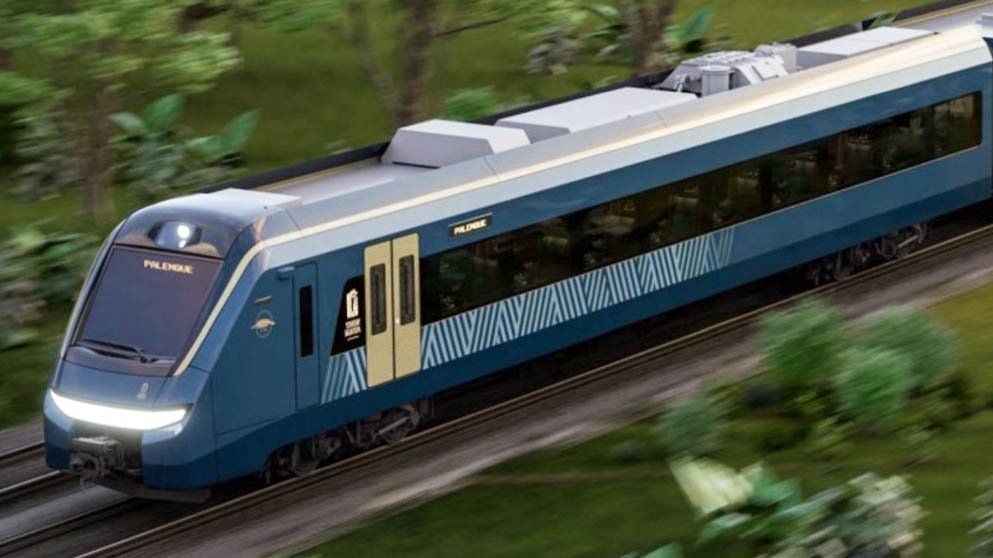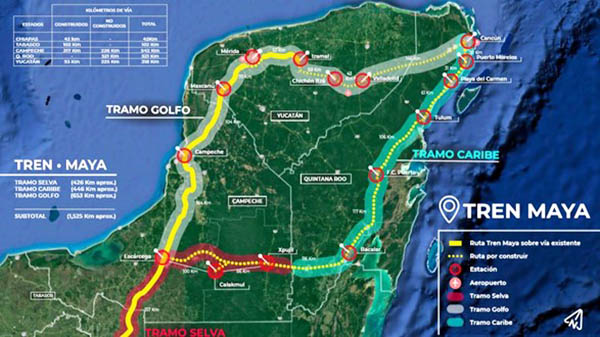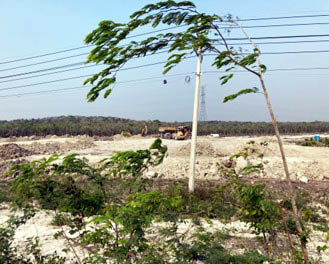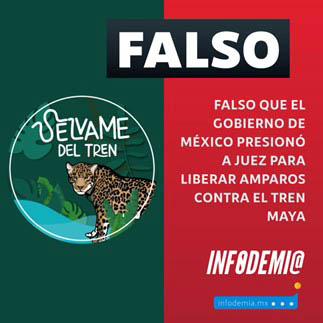|
|
|
|
The weekly newsletter of the México Solidarity Project |
|
|
|
Every issue archived online at mexicosolidarityproject.org |
|
|
|
Tren Maya: Fonatur |
|
The Tren Maya: For Better or For Worse? |
|
No railroad will ever be just a railroad. Railroads transform communities, regions, and nations. In the United States, the transcontinental railroad’s completion took a fragmented society and connected it “from sea to shining sea.”
This connection, with the transcontinental railroad in private hands, made life far sweeter for fabulously wealthy railroad barons than for the Native Americans who lost their lands to the railroad and the Chinese and Irish workers who lost their lives laying the rails.
In contemporary México, AMLO’s Tren Maya project will also be transformational — for an entire region’s social and economic fabric. But this ambitious project, as a public project, isn’t enriching just a few. Under the Tren Maya’s public umbrella, government planners from many areas of expertise — from environmental and social services to economic development and recreation — can work in tandem with the explicit intention of bettering the lives of the region’s people and avoiding enriching the few at the expense of the many.
But “the road to hell,” as they say, “is paved with good intentions.” Does that hold true for railroads to hell as well? In any large-scale project, process looms as important — for better or worse — as product. For this week’s issue, we had the good fortune to talk with Etienne von Bertrab, a person exquisitely situated to help us understand the Tren Maya’s impact.
This ace researcher has spent three years leading a research team that’s been surveying attitudes in the Tren Maya region and analyzing the project’s environmental and cultural impact. We found his perspective fascinating. We think you will, too. |
|
|
The Tren Maya: Everyone All Aboard? |
|
Etienne von Bertrab, born and raised in México, now teaches political ecology at the University of London. His research focus: environmental injustice in Latin America. Over the last three years, von Bertrab has led a team that has conducted an intensive assessment of the Tren Maya, the López Obrador administration’s Mayan train project. His team has paid particular attention to the voices of people living in the southern region.
Why did AMLO make the Tren Maya project a major piece of his 2019-2025 National Development Plan?
AMLO has his roots in Tabasco, and he understands the needs of the communities of México’s southern region. The Tren Maya will connect the southern states of Chiapas, Tabasco, Campeche, Yucatán, and Quintana Roo. |
|
|
Historically, this southern region has contributed a great deal to the national economy, but received, before the AMLO administration, little help from the center. Ever since colonial times, the state has extracted vast resources from the south and left the majority of the population abandoned.
Transport services in this huge area, as big as the UK, have for too long been a monopoly of the private ADO bus company, an outfit that charges prices ordinary people find prohibitive and doesn’t serve small rural communities the company can’t make a profit off of.
Over the last few decades, tourism has become the region’s most important industry, but just a few in Cancún and the “Mexican Riviera” capture the benefits from that tourism. Residents in many communities, particularly young people, must leave home for places like Cancún and Playa del Carmen to find jobs — or go to the US. The stagnation of the region’s economy desperately needs to end. |
|
|
The Tren Maya mapped/LopezObrador.org.mx |
|
But indigenous people have opposed tourism. They see it as disrupting their traditional way of life, right? The Zapatistas have vehemently protested the Tren Maya.
The states of Oaxaca, Yucatán, and Chiapas have México’s highest percentages of indigenous people. Of the five southern states, four have voted into office Morena governors, a signal of support for AMLO’s agenda.
One opposition slogan to the train declares that “Tren Maya is not Maya.” I’ve asked women selling tacos, taxi drivers, people I meet on the street, and even Mayan peasants about that saying. They say, “Why is the Tren Maya not Maya? It is for all of México!” What questions about the train do these people ask? They ask if they’ll be able to take their produce on the train and how much the tickets will cost.
So is the train being imposed on the people? Critics of the indigenous consultations that the AMLO administration held in late 2019 are charging that the project is not fully meeting its promises, and, yes, we’ve seen problems. But people are getting consulted in many ways, including with assemblies in the ejido peasant communities.
In the past, no one consulted the public, let alone indigenous peoples, about anything. Mexican governments always imposed large-scale projects on local communities, often with force and the repression of dissent. |
|
In Xpujil, a small town in Campeche with a 7,000 population, people hadn’t had a decent water supply for decades and worried this problem would only become worse with the urbanization a train station would bring.
The AMLO government moved to ensure this community a water supply, even though this water grievance did not relate directly to the train project. Overall, local people are feeling respected and heard. |
|
|
Future Xpujil Tren Maya station site/ Etienne vol Beltrab |
|
Our research has found no massive popular opposition to the train. Nearly everyone wants a cheaper and easier means of travel for jobs, family visits, and new opportunities for themselves and their children.
Opposition to the Tren Maya is coming from environmental groups who say that the train will damage this area’s fragile ecosystem. True?
The 1,500 kilometers of tracks will, of course, have an impact. Vegetation is being cleared, fauna pathways crossed. Let’s keep in mind that the unregulated growth of tourism, from Cancún to Tulum, has over recent decades destroyed a great deal of the local environment. So environmentalists do have cause for some real worries. |
|
But some environmental groups also tell half-truths and sometimes even outright lies.
One of their accusations charges that the train’s segment 5 between Playa del Carmen and Tulum doesn’t consider possible damage to an underground river system. But I’ve gone to this site with geologists, and I’ve seen the amazing engineering getting used to minimize an adverse environmental impact.
One example: the elevated viaducts built to protect cenotes — deep sinkholes — as well as underground rivers and the region’s archeological vestiges. |
|
|
Infodemia Mx |
|
The train will be far less damaging to the environment than the current four-lane highway that has cars and trucks spewing gas fumes and providing no way for animals to cross. The most vocal opposition group, the Selvame del Tren campaign, was invited to visit the train site, but rejected the offer, refusing to learn the real facts first-hand. This opposition effort has captured international attention, but has no popular base.
So has the Tren Maya project changed from the original plan?
Due to the concerns voiced by local people living along the train route — not the people from across the world who know little about México — the routes of all seven train segments have changed from the original proposal. The original Campeche route, for instance, would have required the unwilling relocation of some 400 families. The government instead changed the route. The route has also changed where archeological findings face risks.
We also saw an outcry about the train disturbing the Volcán de los Murciélagos, the site of a cave home to some 21 million bats. A heavily traveled road currently passes directly over this cave. The Tren Maya’s route has now been moved three kilometers away. It won’t only avoid the cave. It will reduce the traffic on the road overhead.
Critics have also raised the concern that the Tren Maya will cause the traditional ejido system of collective agriculture to disappear.
Until 1992, the year the privatization agenda of President Salinas took hold, ejidos could not be sold. Ejidos in this region, even so, still hold half the land. A range of factors have been perpetuating the ongoing ejido dispossession, with market-led urbanization the biggest threat. But unlike highways that bring development along their entire routes, the urbanization that the Tren Maya will bring will only take place in nodes around stations.
Some people, once the train starts running, will hopefully be able to return to their communities from jobs in the tourist centers and, with government support, even be able to return to farming.
Yet another controversy arose when AMLO put the construction and operation of the Tren Maya under the military. Why not the Department of Transport?
We’re just coming out of a neoliberal period. The military in charge will make it more difficult to privatize the train in the future, in case a new administration with a different ideology comes to power. Criminal organizations remain active in the region, and I have witnessed many people feeling safer with the presence of the National Guard and the military. Revenues from the train’s operation will also help fund military pensions. taking a huge burden off the national budget.
But not everyone feels happy with the military’s participation, and Mexicans will need to keep the government and the military in check.
What importance does the Tren Maya have as a public, not private, project?
Critics of the train like to say that “Tren Maya no es solo un tren” — “The Tren Maya is not just a train.” They’re implying that the train will cause social and ecological dislocation. But that same line, with the project under public control, can mean the exact opposite. The train can help prevent dislocation. If private contractors were running the train, they wouldn’t think about potential negative impacts on people or nature. But the Tren Maya is connecting with other governmental projects and programs that can make a real difference in people’s lives.
The Sembrando Vida project, for example, involves almost half a million farmers. Peasants are getting paid to implement agro-ecological practices for growing crops and planting trees, making the project both a poverty-reduction and a reforestation program. |
|
Near Tulum, another public project, a new park in an enlarged protected area, is stopping excessive urban growth, restoring degraded areas, and conserving flora and fauna — like the endangered jaguar!
Under public control, the Tren Maya is revitalizing the entire region, while preserving the natural environment. Indeed, “Tren Maya no es solo un tren”! |
|
|
In the Playa del Carmen and Tulum/ |
|
|
A Racist US Senate Comment Gets a Media Yawn |
|
The piece/A United States senator, John Kennedy from Louisiana, last week made the blatantly racist charge that the people of México, without the United States, “would be eating cat food out of a can and living in a tent behind an Outback.” That assertion generated no prominent piece of coverage in any major US media outlet. The mainstream media simply took a pass.
The claim/ Senator Kennedy’s racist comment came during a Senate hearing that saw Kennedy urge the Biden administration to use the nation’s economic strength to force México to accept, within its borders, a US military presence to do battle against the drug cartels. Such talk of a military invasion aligns perfectly with the claim that decades of US media reporting on illicit narcotics has reflected: that the ongoing drug crisis results from Latin America’s failure to halt the illegal production and trafficking of dangerous substances.
The back story/ Long before large-scale production of heroin began in México in the 1970s, the 2,000-mile border between México and the US made for an ideal entryway for European drug traffickers eager to get their white powder to US buyers. Cocaine producers would later also use México as a bridge to the lucrative US market. In response, during the Nixon years, the US began militarizing the drug war in much of Latin America. Producers and traffickers of illegal drugs then moved quickly to better arm themselves, largely with illegally imported US guns.
The bottom line/ The US news media does a tremendous disservice to the American public by continuing to characterize the US drug crisis as primarily the result of either weak, corrupt governments south of the border or backward Latin American societies with a penchant for wrongdoing. The decades-long “war on drugs” rests on the US obsession with weapons and its refusal to curb the production and trafficking of guns. The resulting militarized drug war has been a failure on both sides of the US-México border. Yet no major media outlets have rebutted either Senator Kennedy’s racism or the assumptions that underlie his drug crisis “solution.” |
|
|
Pushing Back on a Racist US Senate Attack |
|
Racist outbursts have characterized US Senate deliberations ever since the nation’s founding. The latest came last Wednesday when Senator John Kennedy, a Republican from Louisiana, erupted during an Appropriations Committee hearing with US Drug Enforcement Administration director Anne Milgram. Without the US, said Kennedy, “México, figuratively speaking, would be eating cat food out of a can.” |
|
The México Solidarity Project responded that same day with a news release rejecting Kennedy’s “racist statements.” We’ve excerpted that release below. |
|
|
Immediately following his racist outburst, Senator Kennedy went on to state that President Biden should get on the phone and “make President López Obrador a deal he can’t refuse,” a naked threat against a sitting head of state.
Senator Kennedy’s rant, reminiscent of the dehumanizing rhetoric deployed prior to the invasions of Iraq and Afghanistan, joins calls by other members of Congress, including Representative Dan Crenshaw of Texas and Senator Lindsey Graham of South Carolina, to invade or bomb México. Such outlandish proposals, if acted upon, would cause the death of thousands of innocent people and displace thousands more, while doing nothing to stop the flow of illicit substances such as fentanyl across the border.
White House officials, meanwhile, have done little to try to limit Republican posturing vis-a-vis México. In a recent appearance of his own in the Senate, Secretary of State Anthony Blinken entertained the notion that Washington could designate Mexican organized crime groups as Foreign Terrorist Organizations: a necessary first step to justifying unilateral US military action in Mexico.
Such comments are all the more ironic in light of the fact that drug cartels are armed primarily with US-manufactured guns, the illegal trafficking of which into Mexico the US government has done very little to stem.
Senator Kennedy’s remarks are an insult to Mexican nationals living on both sides of the border, including those who make up an integral part of the United States workforce, and without whose labor the US economy would not be what it is today. It is also insulting to the millions of US citizens of Mexican descent, placing them at greater risk of violence, discriminatory acts and hate crimes.
We call upon Senator Kennedy to retract his comments and make a full and unreserved apology to México and the Mexican-American community. |
|
|
Recent news reports and commentaries, from progressive and mainstream media, |
|
John Stanton, Republican Sen. John Kennedy unleashes racist broadside against Mexicans, Gambit. The Louisiana Republican went on a racist tirade and demanded the Biden administration engage in mafia-style tactics to force México to allow an invasion of its territory by the U.S. military to fight the drug cartels.
Ulises Rodríguez López, AMLO llama a paisanos a no votar por senadores como Kennedy, Polemón. Presidente López Obrador ha lanzado un llamado a los paisanos, latinoamericanos y demás hispanos en los Estados Unidos a no votar por personas como John Kennedy quien dijo que de no ser por Estados Unidos, en México se comería comida para gato.
México to send more National Guard troops to the southern border, México News Daily. AMLO is also trying to emphasize the need to address the root causes that force people to migrate.
Alejandro Páez Varela y Álvaro Delgado Gómez, Si Marcelo Ebrard deja Morena sin tener una oferta sería suicidio político: Zepeda, Sin Embargo. Desde hace 40 años no había llegado un partido con la preponderancia y las probabilidades de repetir sexenio como lo está haciendo Morena y esto significa que muy probablemente la encuesta interna para elegir a su abanderado en 2024 defina a los mexicanos quién va a ser el Presidente de México el próximo sexenio.
México’s high court annuls part of controversial electoral reform, Al Jazeera. The court, charges Mexico’s secretary of the interior, has “decided to continue protecting private interests.”
Así respondió el embajador Moctezuma a las palabras "vulgares y racistas" del senador Kennedy, Proceso. El embajador de México en EU dio a conocer la carta que envió al republicano, quien afirmó que "sin el pueblo de Estados Unidos, México estaría comiendo alimento para gatos".
Kierra Frazier, Mexican president calls Florida’s new anti-immigration bill ‘immoral,’ Politico. Governor DeSantis, charges AMLO, is taking “advantage of people’s pain, of migrants’ pain, of people’s need for political gain.”
Peso registra niveles no vistos desde 2017, al caer a 17.59 por dólar, Aristegui. La moneda nacional se ubicó en 17.61 por dólar, aunque llegó a avanzar hasta 17.59 por dólar, un nivel no visto desde el 25 de agosto de 2017.
México president set to present constitutional reform for election of judges, magistrates, Reuters. AMLO has slammed the judiciary as representing the interests of the country’s conservative bloc.
Andrea Gómez, La norma estadounidense “Título 8” transgrede el derecho internacional de los refugiados: ACNUR y OIM, ContraLínea. La norma estadounidense “Titulo 8” transgrede los derechos fundamentales de los refugiados y migrantes. Es incompatible, inaceptable y contraria a las obligaciones de los Estados, aseveraron conjuntamente la Agencia de la ONU para los Refugiados y la Organización Internacional para las Migraciones. |
|
|
The Mexico Solidarity Project brings together activists from various socialist and left organizations and individuals committed to worker and global justice. We see the 2018 election of Andrés Manuel López Obrador as president of México as a watershed moment. AMLO and his progressive Morena party aim to end generations of corruption, impoverishment, and subservience to US interests. Our Project supports not just Morena, but all Mexicans struggling for basic rights, and opposes US efforts to undermine organizing and México’s national sovereignty. Editorial committee: Meizhu Lui, Bruce Hobson, Bill Gallegos, Sam Pizzigati, Courtney Childs, Victoria Hamlin, Agatha Hinman, Steven Hollis, Daniel McCool, Betty Forrester, Jesús Hermosillo. To give feedback or get involved yourself, please email us! |
|
Subscribe! Get the México Solidarity Bulletin in your email box every week. |
|
Web page and application support for the México Solidarity Project from NOVA Web Development, a democratically run, worker-owned and operated cooperative focused on developing free software tools for progressive organizations. |












